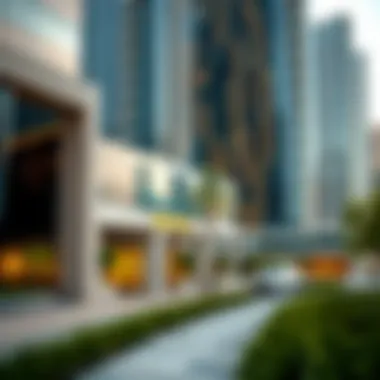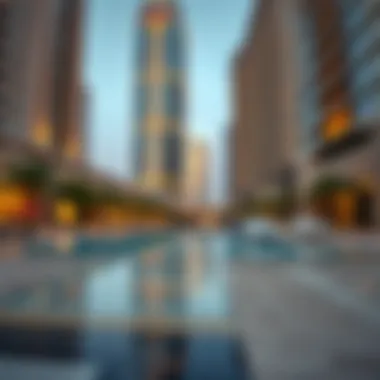DIFC Hotels: A Blend of Luxury and Business


Intro
The Dubai International Financial Centre (DIFC) stands as a beacon of luxury, an abode where opulence meets business sophistication. This vibrant enclave is not merely a hub for financial transactions; it's also a hotspot for unique hotel experiences that cater to both corporate and leisure travelers. As you navigate through the DIFC, you might notice how its hotels encapsulate the essence of the city—each property offers a distinctive charm, crafted to perfection.
In this article, we will explore the fascinating hotel landscape of DIFC, dissecting the architectural designs that set these establishments apart and understanding the premium services they provide. Alongside this, we will delve into the economic implications of these luxurious lodgings, offering investors insights into current market trends and future projections. Particularly for those keen on the real estate landscape, the correlation between high-end accommodations and local property value is crucial.
Through detailed examination, we aim to shed light on the intricacies of hotel offerings in DIFC, from the lavish amenities to the investment potential they hold. Whether you are a seasoned traveler, an investor eyeing promising opportunities, or simply an enthusiast looking to understand Dubai's dynamic real estate sector, this comprehensive guide has something for everyone.
Prelims to DIFC
The Dubai International Financial Centre (DIFC) represents more than just a financial hub; it’s a vibrant locale where business and luxury converge. As one of the leading global financial centers, DIFC brings with it a unique hotel landscape that caters to a diverse clientele — from bustling business travelers to leisure seekers enchanted by luxury experiences. The hotels within this district epitomize sophistication, premium service, and unrivaled amenities. Understanding DIFC is crucial not merely for those seeking accommodation but for investors and property managers discerning the evolving needs of visitors in this dynamic region.
Historical Context of DIFC
DIFC officially opened its doors in 2004, seeking to position Dubai as a reputable alternative to traditional financial centers like London and New York. The establishment marked a significant pivot for the United Arab Emirates, enhancing its status on the global economic map. Drawn from a vision to attract multinational companies, DIFC has grown into a thriving community that houses over 20,000 professionals working in finance, law, and other major sectors.
In the initial years, DIFC steadily developed its infrastructure, with a particular emphasis on ornate architectural designs that reflect both Dubai's modernity and its cultural heritage. The architectural marvels, which now frame the skyline, have become symbols of growth and innovation. This success has laid fertile ground for the hotel industry, where establishments have risen to meet the strong demand from international businesses and leisure travelers.
Importance in Dubai’s Economic Landscape
DIFC isn’t just a financial district; it is a cornerstone of Dubai’s broader economic strategy. Boasting a regulatory environment that caters to business efficiency and nurturing innovation, it enhances Dubai's attractiveness as a location for global investors. The hotels within DIFC play a pivotal role in supporting this ecosystem.
They provide essential services such as:
- Accommodation for international clients: Business travelers benefit from proximity to key financial institutions.
- Networking hubs: Many hotels offer meeting rooms and event spaces that facilitate networking and business discussions.
- Quality amenities: Enhanced services like fine dining and wellness facilities appeal to high-profile guests, creating a luxurious experience.
"The properties in DIFC not only reflect architectural brilliance but also the essence of a modern economic landscape, showcasing how hospitality and commerce intertwine."
Overview of DIFC Hotels
The Dubai International Financial Centre (DIFC) presents a diverse array of hotels that cater to various tastes and preferences. Understanding this landscape is crucial for potential visitors, business travelers, and investors. The DIFC hotels not only serve as places for rest and relaxation but also play significant roles in the broader economic framework of Dubai, particularly in terms of attracting both business and leisure travelers. Each type of accommodation brings its own flavor to the DIFC experience, making it vital to appreciate what each category offers.
Types of Accommodations
Luxury Hotels
Luxury hotels in DIFC, such as the Ritz-Carlton and the Four Seasons, exemplify the epitome of opulence. The plush bedding, world-class service, and breathtaking views are just the beginning. These hotels often feature high-end amenities like fine dining restaurants curated by Michelin-starred chefs and exceptional spa facilities. One key characteristic of luxury hotels is their ability to provide a bespoke experience, ensuring that every detail meets the discerning guest’s needs.
Especially attractive for high-profile corporate guests and tourists, they offer an advantage by positioning their guests near key financial institutions and cultural landmarks. However, the cost of staying in luxury hotels can be a consideration, making them less accessible for all visitors.
Business Hotels
Business hotels in DIFC, including names like the Le Meridien and Conrad, are designed with the corporate traveler in mind. They are strategically located to provide easy access to key financial districts and offer extensive business amenities like meeting rooms, high-speed internet, and tailored services to meet the needs of professionals. What sets them apart is their emphasis on efficiency and convenience; they often feature express check-in and access to business lounges where travelers can network or work outside their rooms. The convenience and functional design of these hotels are significant benefits, though they may lack the luxurious indulgence found in more upscale counterparts.
Boutique Hotels
Boutique hotels like the Vida Downtown add a unique charm to the DIFC accommodation scene. These hotels focus on personalized service and distinctive design elements. Often reflecting local culture and art, they create a warm, inviting atmosphere that makes guests feel at home. The intimate setting and specialized services appeal to travelers looking for unique, cozy experiences rather than the grand scale of luxury or the functionality of business hotels. While boutique hotels provide a more personal touch, they may have fewer amenities compared to larger establishments, which could be a factor for travelers needing certain services or facilities.
Key Players in the Market
The DIFC hotel market includes several notable brands that shape the landscape. Major players like Jumeirah, Marriott, and Accor dominate the scene, enhancing competition and variety. Each brand brings its specific philosophy and set of amenities that cater to the diverse needs of travelers. While luxury chains tend to draw more affluent patrons, boutique hotels attract those seeking a tailored, local experience. Investors should keep an eye on these dynamics, as shifting preferences can signal lucrative opportunities.
Hotel Architecture and Design
The architecture and design of hotels within the Dubai International Financial Centre (DIFC) is not just a matter of aesthetics; it plays a pivotal role in the overall experience offered to guests. Each structure contributes to the skyline, embodying a blend of modernity and innovation that reflects Dubai’s ambition to be a hub of finance and tourism. In a landscape bustling with high-rises and corporate headquarters, the hotels stand out not just as places to stay, but as landmarks that invite reflection on the city’s values and aspirations.
When it comes to architecture in this particular district, several elements come into play. These include the integration of cutting-edge technology, sustainable practices, and a showcase of cultural influences. All these aspects are crucial, as they enhance the functionality and visual appeal of the hotels while responding to the needs of a discerning clientele. Moreover, the architectural styles adopted set the tone for the kind of experiences that await guests, making it essential to analyze the underlying trends and notable achievements in this realm.


Influence of Modern Design Trends
Modern design trends, characterized by sleek lines and open spaces, have become prominent in the DIFC hotel scene. Hotels like the Four Seasons and Waldorf Astoria embrace these trends, showcasing minimalistic decor that emphasizes elegance and simplicity. The use of glass facades allows natural light to flood in, creating airy interiors, a feature that many visitors find appealing.
On the other hand, one cannot dismiss the inclination towards incorporating smart technology into hotel designs. Features like touchless entry systems, smart room controls, and integrated communication systems are increasingly common. These design elements don’t just upgrade a hotel’s technological footprint; they enhance guest convenience, positioning these establishments as leaders in hospitality innovation.
Other aspects include the incorporation of local materials and art, paying homage to the region’s heritage while providing modern comfort. It’s almost like having a slice of Dubai’s culture right in the heart of luxury.
Notable Architectural Achievements
DIFC is home to several hotels that stand as prime examples of architectural brilliance. For instance, the Raffles Dubai showcases a pyramid-like structure that is instantly recognizable and quite iconic. This unique design speaks to its ambition; not only does it redefine the idea of luxury accommodations, but it also highlights the architectural diversity that permeates the district.
Furthermore, the Taj Dubai offers a blend of traditional Indian design with modern sophistication. Its intricate decor, vibrant colors, and grand views of the Burj Khalifa perfectly encapsulate the essence of both the cultural heritage and contemporary style.
Other remarkable constructions include the Mandarin Oriental, renowned for its blend of extravagant interiors with innovative architecture. The designs and spaces are thoughtfully curated to foster a sense of well-being, thus attracting travelers eager to enjoy both aesthetic pleasure and luxury comfort.
"The architecture of DIFC hotels serves as a bridge between opulence and sophistication, becoming part of the city's narrative of success."
In summary, the hotel architecture and design within DIFC not only enhance the visual landscape of Dubai but also play a crucial role in creating unforgettable guest experiences. As trends shift and the skyline evolves, these architectural gems will continue to define the hospitality experience in this bustling financial hub.
Luxurious Amenities in DIFC Hotels
In the bustling heart of Dubai, DIFC hotels stand out not only for their architectural splendor but also for their opulent amenities. These facilities cater to a discerning clientele, prioritizing comfort, convenience, and luxury. A deep dive into the various offerings reveals how these amenities enhance the overall experience for visitors, making them more than just places to stay.
Gastronomy Experiences
Fine Dining Options
Fine dining in DIFC hotels is a symphony of culinary artistry. Renowned chefs curate menus that celebrate global flavors while blending local ingredients, creating dishes that are both innovative and culturally rich. Dining in such establishments is not just about the food; it's about the entire experience. For instance, restaurants often incorporate stunning views of the Dubai skyline, allowing guests to savor their meals in an atmosphere that exudes sophistication.
One characteristic that sets these fine dining options apart is the attention to detail. From exquisite table settings to personalized service, each aspect is meticulously orchestrated to provide a memorable meal. This level of commitment makes fine dining a highly sought-after choice for both business travelers and leisure guests.
The unique feature of fine dining in DIFC is its ability to host exclusive events and private dining. This is particularly advantageous for those looking to impress clients or celebrate special occasions. However, it is essential to note that such luxurious experiences often come with a hefty price tag, which might not appeal to every visitor.
Casual Eating Establishments
On the flip side, casual eating establishments within DIFC hotels offer a more relaxed atmosphere, appealing to guests seeking comfort food or a quick bite. These eateries balance quality with accessibility, providing menus that cater to diverse palates without sacrificing excellence.
A key characteristic of these casual spots is their vibrant ambiance. Many feature open kitchens, allowing patrons to witness the culinary magic as it unfolds. This creates an engaging environment that encourages social interaction, making it an attractive option for both hotel guests and locals alike.
A unique feature of casual eating establishments is their variety. From international fast bites to local favorites, the choice is ample. Such diversity means that guests can enjoy a meal that fits their mood and schedule, making it a convenient option. The main drawback here may be the absence of the intimate touch that comes with fine dining, but the emphasis on a laid-back experience often compensates for it.
Wellness and Spa Services
Health Clubs
Health clubs in DIFC hotels cater to the modern traveler keen on maintaining fitness routines even on the road. These clubs are typically equipped with state-of-the-art machines and a range of classes that encourage both physical fitness and mental well-being. For those who prioritize wellness, this is a considerable draw.
A distinctive characteristic of health clubs in this area is their holistic approach to fitness. Guests often have access to personal trainers and wellness coaches who provide tailored guidance, ensuring that they can achieve their health goals while away from home. This personalized service makes health clubs not just a facility, but a support system.
Moreover, many hotels offer unique features like rooftop gyms with stunning views, which enhance the workout experience. However, potential downsides may include restrictions on access for non-hotel guests, limiting the pool of potential clients.
Swimming Pools
Swimming pools in DIFC hotels are also more than mere leisure facilities. They provide a sanctuary of relaxation amidst the city’s hustle and bustle. Many pools are designed with stunning aesthetics, often blending seamlessly with the surrounding architecture.


A standout characteristic of these swimming pools is the emphasis on creating luxurious environments. Many feature cabanas, poolside dining options, and attentive service, making it easy for guests to unwind in style. This level of luxury often appeals to those looking to escape the often hectic pace of city life.
The unique advantage of swimming pools in DIFC hotels is their integration into social spaces. They serve as social hubs, where guests can mingle and network while enjoying a swim or lounge by the water. However, some guests may find these environments considerably crowded, especially during peak seasons.
Overall, the luxurious amenities found in DIFC hotels significantly contribute to the overall attractiveness and functionality of these establishments. From fine dining to wellness, they cater to the diverse needs of both business and leisure travelers.
The combination of high-end offerings and thoughtful design creates a unique hospitality experience that reflects the vibrant spirit of Dubai.
DIFC as a Business Hub
The Dubai International Financial Centre (DIFC) stands as a testament to modern business dynamics in the Middle East. It functions not merely as a geographical entity but as a powerful magnet for professionals and corporate giants alike. DIFC’s significance as a business hub stems from its strategic positioning, regulatory framework, and robust infrastructure, which collectively foster a thriving ecosystem for both local and international businesses. Understanding these elements can unveil the reasons why DIFC hotels cater extensively to a discerning clientele seeking not just accommodation but an entire experience that aligns with their professional goals.
Catering to Business Travelers
Business travelers are a unique demographic, often juggling tight schedules while seeking effective ways to blend work and leisure. DIFC hotels have recognized this requirement, tailoring their services to meet these needs. High-speed internet, dedicated workspaces, and concierge services that can manage everything from meeting bookings to transportation are just the tip of the iceberg. Here are a few notable features that differentiate these hotels:
- 24/7 Business Services: Hotels like the Radisson Blu Residence, Dubai Marina provide administrative assistance, ensuring that everything from printing documents to booking conference rooms is handled seamlessly.
- Networking Opportunities: Many hotels host regular business events or networking sessions. For instance, the Four Seasons Hotel Dubai International Financial Centre organizes industry-specific gatherings that encourage collaboration among business travelers.
- Proximity to Financial Institutions: With banks, venture capital firms, and other financial entities just a stone's throw away, locations like the Sofitel Dubai Downtown provide easy access, saving time and increasing productivity.
These caterings create a welcoming environment, amplifying the overall stay for business guests.
Conference and Meeting Facilities
When it comes to hosting meetings and conferences, the DIFC hotels go above and beyond. State-of-the-art conference facilities are not just an add-on; they are integral to the value proposition that these hotels offer. Here’s how they stand out:
- Versatile Meeting Spaces: Accommodating different sizes, from intimate board meetings to grand conferences, hotels like the Ritz-Carlton, Dubai offer versatile spaces with removable partitions to adjust the layout as needed.
- Advanced Technology: Equipped with top-tier audiovisual systems, high-speed wireless internet, and teleconferencing tools, these facilities ensure that business operations are uninterrupted. Hotels like JW Marriott Marquis have specially designed suites that offer seamless tech integration.
- Catering Options for Events: Quality catering is paramount for any business event. Many hotels provide customized menus by their acclaimed chefs, like at the Taj Dubai, enabling businesses to impress their clients while ensuring everyone’s dietary preferences are observed.
This array of services and facilities reinforces DIFC’s prominence as a destination for serious business engagement, making it an attractive choice for companies looking to establish or enhance their presence in the region.
In summary, the DIFC hotel landscape speaks volumes about Dubai’s ambition to position itself as a crucial hub for international business. The tailored amenities for business travelers and the comprehensive meeting facilities create an environment that not only supports business activities but enhances them, making it a pivotal area for any professional seeking to navigate the Middle Eastern market.
Sustainability Efforts in DIFC Hotels
In recent years, sustainability has emerged as a critical concern worldwide, especially in the hospitality sector. The DIFC hotels have taken this mission to heart, aligning their strategies with the global movement toward environmental empathy. By integrating sustainable practices into their operations, these hotels are not only minimizing their ecological footprint but also appealing to a growing demographic of conscious travelers. This section will delve into the various green initiatives taken by DIFC hotels and their overarching role in promoting sustainable tourism.
Green Initiatives and Certifications
The commitment to sustainability is vividly displayed through various green initiatives and certifications that differentiate DIFC hotels from their counterparts. Leading hotels like the Armani Hotel Dubai and The Ritz-Carlton, Dubai have made remarkable strides in the adoption of eco-friendly practices.
- Energy Efficiency: Many hotels have implemented smart technology for energy conservation, including motion sensor lighting and energy-efficient HVAC systems, reducing energy waste significantly.
- Water Conservation: Water-saving fixtures and greywater recycling systems are incorporated into many DIFC hotels, aiming to lessen water usage without compromising guest comfort.
- Waste Management: Efforts to minimize waste have seen hotels adopt comprehensive recycling programs, often directly engaging guests in their sustainability efforts. Recycling bins commonly found in hotel lobbies serve as reminders for sustainability.
- Certifications: Acquiring certifications from reputable organizations like LEED (Leadership in Energy and Environmental Design) signals a hotel’s commitment to sustainable practices. Hotels in DIFC, such as the Four Seasons, proudly display their green statuses, appealing to a demographic that prioritizes environmental stewardship.
"Sustainability is the heart of innovation in hospitality, and the DIFC hotels are leading that charge in the region."
Role in Promoting Sustainable Tourism
Beyond their internal practices, DIFC hotels embrace their role in broader tourism initiatives aimed at sustainability. By setting benchmarks and fostering partnerships, they actively contribute to the promotion of sustainable tourism, benefitting both the local community and the visitors who frequent this vibrant district.
- Local Sourcing: Many hotels prioritize local produce and products in their restaurants, which not only decreases carbon emissions linked to transportation but also supports local farmers and businesses. Dining at DIFC hotels often features a rich selection of dishes rooted in local flavors, reflecting the region's bountiful heritage.
- Collaborations with Eco-Friendly Organizations: Partnerships with organizations such as the Dubai Sustainable Tourism initiative pave the way for robust programs that align tourism with conservation efforts. These collaborations often provide guests opportunities to engage with local conservation projects, whether through educational tours or hands-on participation.
- Community Engagement: Providing space and support for local art exhibitions and cultural events creates a more sustainable tourism experience. This approach fosters a sense of community, and visitors can enjoy authentic cultural experiences while knowing their patronage helps support local artists and communities.
In essence, the sustainability efforts employed by hotels in the DIFC not only serve to protect the environment but also reinforce the area as a dynamic and responsible destination for travelers. As the landscape of travel continues to evolve, these initiatives position DIFC hotels as leaders in the movement toward a more sustainable future.
Impact on the Real Estate Market
The bustling energy of the Dubai International Financial Centre (DIFC) extends far beyond its shimmering skyline and luxurious hotels. While it’s often associated with high-end accommodations and lavish experiences, the impact of DIFC hotels on the real estate market deserves a deeper examination. With their unique blend of luxury and functionality, these establishments significantly influence property values, investment trends, and the overall economic landscape of the area.
Property Values and Investment Trends


Over the past decade, DIFC has transformed into a multi-faceted hub that attracts not only tourists but also investors looking to capitalize on prime real estate opportunities. Hotels in the DIFC area play a pivotal role in sustaining and elevating property values. The mere presence of high-end hotels can lead to an increase in surrounding property values, as investors typically view such amenities as indicators of growth and prestige. For instance, the lavish Four Seasons Hotel Dubai not only brings in affluent travelers but also boosts interest and investment in nearby residential buildings and commercial spaces.
Factors that contribute to this trend include:
- High demand for luxury accommodations: International firms frequently seek out DIFC for office space due to its strategic location, thus driving the need for premium lodging options nearby.
- Enhanced infrastructure: With hospitality projects often come improved transport networks, amenities, and services that increase the attractiveness of the area for potential residents and businesses.
- Tourism spillover effect: Hotels in DIFC draw in a steady stream of tourists, which consequently stimulates the local economy and raises demand for premium housing.
In this dynamic environment, investors are keenly attuned to emerging trends. Some are focusing on mixed-use developments that combine residential, commercial, and hospitality functions to create vibrant communities that further attract investment. The shifting preferences of the affluent—especially younger generations seeking diverse living options—reinforce the notion that the DIFC district is more than a transient stop for business travelers; it’s an investment haven.
Market Forecast and Opportunities
Looking ahead, the future appears promising for the DIFC’s real estate market, bolstered by a number of trends. Industry experts predict continued growth, driven by the recovery of global tourism and an increase in foreign investment. Significant upcoming events, such as major international conferences, will likely enhance the visibility of DIFC hotels and the overall district, creating more opportunities for growth in both hospitality and real estate.
Opportunities worth considering include:
- Long-term rental properties: With a growing expatriate population drawn by employment opportunities in finance and technology, the demand for longer-term accommodations is on the rise.
- Sustainable tourism initiatives: Investors who are keen on environmentally friendly practices will find potential in hotels that are adopting sustainable measures. These practices not only appeal to eco-conscious travelers but also align with government initiatives promoting sustainable developments.
- Co-working spaces and business hotels: As more professionals adopt flexible working arrangements, demand for blended hospitality spaces—where business and leisure coalesce—will present lucrative investment opportunities.
"Navigating the real estate waters in DIFC is akin to setting sail toward uncharted territories. With each wave, more opportunities surface, signaling potential growth for those ready to take the plunge."
In summary, the intersection between DIFC hotels and the real estate market highlights a fascinating synergy. The upscale accommodations are more than mere places to stay; they shape the property landscape, influence investment strategies, and foster economic development. Investors who act strategically can position themselves advantageously in this vibrant environment.
Cultural Influences and Experiences
The Dubai International Financial Centre (DIFC) is not just a hub for commerce, but also a melting pot of cultures, traditions, and artistic expressions. This section sheds light on how cultural influences shape the experiences offered by hotels in the DIFC, underscoring the significance of that aspect for travelers and local residents alike. With a rich tapestry of heritage woven into the fabric of the city, the cultural experiences within DIFC hotels are both diverse and redefining.
Cultural Events and Festivals
DIFC’s vibrant atmosphere comes alive during various cultural events and festivals, making it an attractive destination for tourists and local inhabitants. One of the significant events is the Dubai Art Season, where art lovers gather to celebrate local and international art. The DIFC hosts workshops, exhibitions, and showcases that attract a considerable footfall. Moreover, throughout the year, several festivals highlight the rich Emirati culture, including Islamic New Year and Eid celebrations.
- Art Exhibitions: Local galleries open their doors for international artists, providing an authentic taste of creativity in the city.
- Culinary Festivals: DIFC hotels often participate in food festivals that celebrate both local and global cuisines, allowing visitors to indulge in unique gastronomic adventures.
- Cultural Workshops: Many establishments offer workshops that focus on traditional Emirati crafts, cooking classes, or even language lessons. This way, travelers get to interact with local artisans, gaining insights into their crafts.
During these events, hotels act as venues for exhibitions or workshops, further enriching the experiences of their guests. They become places where cultural conversations transpire, and connections are formed.
Art and Design Integrations
The architecture of the DIFC hotels does not merely serve a functional purpose; it speaks volumes about a confluence of global artistic influences and local design traditions. Many hotels have set out to curate spaces that embrace art and design, turning lobbies and lounge areas into gallery-like settings. This infusion of art creates a unique atmosphere where guests are not just passive observers but engaged participants in a broader cultural narrative.
Key points on art and design integration include:
- Unique Installations: Many hotels showcase works from local artists or international art fairs, making every visit feel like a fresh experience.
- Design Aesthetics: Modern and traditional design philosophies coexist harmoniously, showcasing the essence of Dubai’s hybrid culture. For instance, the One&Only Royal Mirage incorporates intricate Islamic calligraphy within contemporary architectural forms, creating a feast for the eyes.
- Interactivity: Guests are often invited to participate in artistic endeavors, such as painting classes or photography tours, facilitated by the hotels, drawing them deeper into the local culture.
"Art and culture are inseparable when it comes to hospitality. In DIFC, they aren’t just part of the experience, they are the experience." – A local artist sharing their insights on the importance of cultural integration in hotel hospitality.
These cultural experiences not only enrich the guest's stay but also enhance the ability of these hotels to attract new visitors, thereby contributing to the overarching goal of promoting tourism and global engagement in the DIFC area. Investors and buyers seeking to delve into this landscape should take note of the vital role culture plays in shaping the consumer experience in DIFC hotels.
As the DIFC continues to evolve, it remains poised at the intersection of business and culture, strengthening its position as a leading destination in Dubai.
Finale
Drawing a line under the diverse topics discussed, the conclusion serves as a crucial synthesis of the perspectives shared throughout this article. The DIFC hotel's landscape is not only a reflection of luxury and architectural prowess; it encapsulates a much wider narrative about Dubai’s economic environment and cultural integration.
Summary of Key Insights
In summation, several vital observations emerge:
- Diversity of Offerings: From luxury accommodations to modern business hotels, the DIFC caters adeptly to both leisure tourists and business professionals.
- Architectural Distinction: Each hotel boasts unique designs, symbolizing the innovative spirit of the DIFC itself.
- Culinary Ventures: Gastronomy remains a hallmark of the DIFC hotel experience, with a plethora of dining options that cater to every palate.
- Sustainability Efforts: Many hotels are actively engaging in practices that promote sustainability, setting a standard for future developments.
- Investments Trends: The landscape illustrates a promising real estate market, where hotels significantly contribute to property values and attract investors.
These insights elucidate how the DIFC hotels not only fulfill the immediate needs of travelers but also contribute to the broader context of Dubai's growth and sustainability.
The Future of DIFC Hotels
Looking ahead, the trajectory for DIFC hotels appears robust but nuanced. As the hospitality sector continues to evolve, key elements are poised to shape the industry's future:
- Tech Integration: With advancements in smart technologies, hotels may increasingly adopt tailored experiences, enhancing guest amenities.
- Sustainability Focus: The trend towards eco-friendly practices is likely to gains momentum, driving hotels to adopt new sustainability certifications and green technologies.
- Diverse Experiences: The demand for experiential stays over mere accommodations may push hotels to innovate, incorporating local culture and community engagement into their offerings.
- Market Adaptation: As global travel trends shift, DIFC hotels might need to adapt, catering to emerging traveler profiles and altered preferences post-pandemic.



